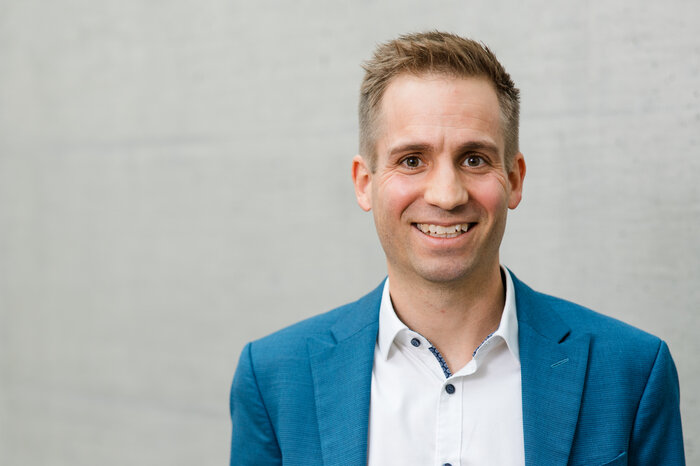New research leadership
Markus Preißinger (38), endowed professor for energy efficiency and head of the Energy research centre, will be operationally responsible for managing research at Vorarlberg University of Applied Sciences from January 1, 2022, further expanding it in the future and making it even more visible both regionally and internationally. We asked the native of Allgäu for an interview.

Which research topics are you personally currently involved with?
My research topic for many years has been thermal energy systems - chillers, heat pumps, but also power plants based on renewable energies such as biomass or geothermal energy. Equipping these systems with intelligence, for example, is a current topic of the Josef Ressel Center for Intelligent Thermal Energy Systems, which I head.
Have you always wanted to work in research, when did the attraction grab you? And what phenomenon won't let you go?
Actually, I just wanted to study power engineering and then go into industry. From the 5th semester, however, I was then very much involved with university politics and thus had the opportunity to discuss very early with Professor:innen from different disciplines and get to know their research. I was always fascinated by topics that sound so simple, but whose solution delivers a high added value for humanity - for example, how do we manage to produce clean drinking water everywhere in the world?
What makes you personally as a scientist? Where do your strengths lie?
I have always seen science very broadly - away from the idea of one person cracking a problem experimentally or simulatively somewhere in a quiet closet. Science is communication and discussion, it thrives on asking questions and coming up with solutions, but it is also involved in politics and in business and management. I see my strength in the fact that I feel comfortable in all these areas and can also communicate - there are better "pure" scientists than me (laughs).
How are the research and research centres at the FHV set up?
We are very broadly positioned and cover a wide range of topics for the size of our university: social science as well as technical focus, experimental work as well as computer-based developments. This is important for the Vorarlberg Business and Management - because this also draws its strength from diversity.
In what direction should research at the FHV continue to develop?
Over the next few months, I want to work out the direction in terms of content together with the approximately 80 researchers at the FHV and in discussions with important stakeholders. Personally, I want to maintain the breadth in research, further expand cooperation with regional Business and Management, but also become more visible internationally in some fields. And we want to be open to other areas - the topic of sustainability in all its facets, for example, occupies me day after day.
What is your goal as head of FHV research?
My most important goal is to justify the trust of our partners through excellent research and development and thus also to win new partnerships in Business and Management. Especially in the regional environment, we would still have a lot of potential through the cooperation of all players, which we are currently leaving untapped.
What is your goal as a scientist?
I think a science prize for outstanding basic research I will probably no longer win through my new tasks (laughs) - so as a scientist, I want to enable young scientists in particular to find and go their personal way in science. If then at some point someone says: "yes the Markus helped me to go this way back then", then I can be satisfied.
Which instrument (e.g. laboratory) are you particularly proud of at the FHV that we have and what can it do?
The most important instrument in science is and remains the human being, the competence and the motivation of the employees - and such "heads" we have very many at the FHV. Only in the second step are special measurement setups special. I am always proud of equipment that is available on the market, but which we breathe additional life into through conversions or expansions. When, for example, we only recognize things in our computer tomograph or in our scanning electron microscope because we have "tinkered" with something beforehand, then I walk around the campus with a smile.
In the FHV Opportunity Lab, successes and failures of experiments are factored in. What was their greatest success and what went badly wrong once?
My greatest success as a scientist was demonstrating that a simple wetting process can be used to turn bilge water, an almost tar-like mixture of oil, water and sediment from shipping, into recycled oil on a pilot plant scale. At the same time, this success was also my biggest failure - it worked, but it didn't fit the theory and we didn't understand why it worked. The nice thing about it is that we were able to acquire another research project with the topic, on which a member of my research centre is now working on his doctorate - we will complete the project at the beginning of 2022, and in the meantime we know much better what happened in the experiments back then.





